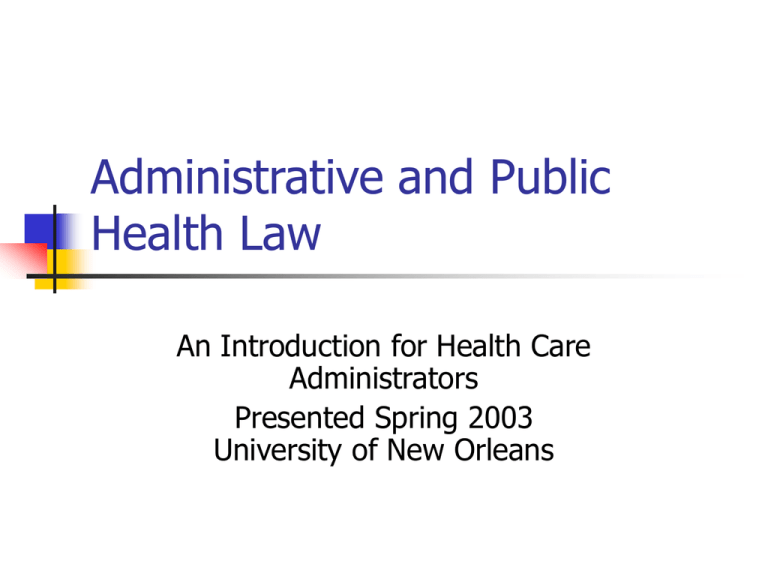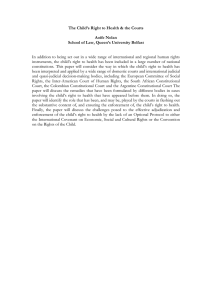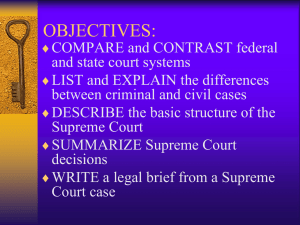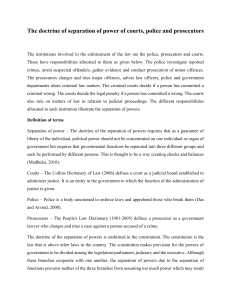Public Health Law - An Introduction for Health Care Administrators
advertisement

Administrative and Public Health Law An Introduction for Health Care Administrators Presented Spring 2003 University of New Orleans First Things For ten years prior, the yellow-fever had raged almost annually in the city, and annual laws were passed to resist it. The wit of man was exhausted, but in vain. Never did the pestilence rage more violently than in the summer of 1798. The State was in despair. The rising hopes of the metropolis began to fade. The opinion was gaining ground, that the cause of this annual disease was indigenous, and that all precautions against its importation were useless. But the leading spirits of that day were unwilling to give up the city without a final desperate effort. The havoc in the summer of 1798 is represented as terrific. The whole country was roused. A cordon sanitaire was thrown around the city. Governor Mifflin of Pennsylvania proclaimed a nonintercourse between New York and Philadelphia. Communicable Disease in the Colonies Mostly poorly drained coastal areas Terrible epidemics Malaria, Yellow Fever Smallpox Nearly wiped out the Constitutional Convention Quarantines, areas of non-intercourse Colonial governments did public health Constitutional Provisions Articles of Confederation Left all powers to the states Did not work during the War Constitution Divided powers between the state and federal government Reserved the police power to the states Police Power Police departments came later Power to protect the public health and safety Communicable disease control Sanitation Nuisance Drinking water Federal Powers Direct constitutional powers Interstate commerce Foreign Trade War Civil Rights (13, 14, 15th amendments) Income Tax Most regulation is Commerce Clause Is there a Federal Police Power? Constitutional Debate Can the Feds do local disease control? US Supreme Court says no, but ... CDC only comes in at the state's invitation Public Health is state and local Can the Feds require smallpox vaccinations? Invasion Clause? Limits of the Police Power Very broad Protect public health and safety Must be prospective Public health regulations are about preventing future harm Must be civil, not criminal The reason for the action, and not the results, determine whether it is criminal Confinement in jail Megan's laws and confinement of sexual predators Constitutional Criminal Rights Right to remain silent Confront accusers and present witnesses Right to counsel Trial by jury Certain other protections attendant on their criminal prosecution. These rights make criminal prosecutions slow and expensive Specific laws limit the ability of law enforcement to respond to new problems. Administrative Law Public health law, and most health law, is carried out by government agencies State Department of Health HHS HCFA, now CMS More generally, government works through agencies Constitutional Basis of Administrative Law The US Constitution does not mention agencies The founders did not anticipate that there would be much federal government Administrative law doctrines have been shaped by Congress and the courts, within the constraints of the Constitution Historical Background First 100 years - state law Through the late 1800s, the states did almost all regulation They were very intrusive Limited some by the US Supreme Court in the late 1800s Interference with interstate commerce Due process and equal protection Chinese Laundry cases Federal Agencies Interstate Commerce Commission New Deal Antitrust Railroads Modern agencies Supreme Court fights - switch in time, saves nine Still very limited Post-WW II - never really demobilized Enabling Legislation Agencies are established by legislation Can be detailed or broad Establishes structure and mission Budget Protect the public health Cheap electric power and plenty of it Contrast with the ADA Agency is limited by the legislation and the state and US constitutions Separation of Powers Agencies are part of the executive branch of government Federal agencies are under the President Created by legislatures Reviewed by courts Independent agencies have appointed commissions States can have multiple executives AG, Insurance Commissioner, etc. Legal Justification for Agencies Expertise Efficiency Agencies are meant to have expert staff who manage complex problems Agencies have more efficient enforcement powers because they are not limited by criminal law protections Flexibility Agencies can act without new legislation Agencies can tap new expertise as needed Agency Functions Rulemaking Agencies make rules to particularize statutes and for public guidance The public is allowed to participate in rulemaking Adjudications Agencies take enforcement actions through agency courts Judicial Review Agencies cannot act beyond the constitution or the enabling legislation Agencies must follow appropriate procedures APAs Agency rules Deference to Agency Action Courts defer to agency decisionmaking on area of agency expertise Fact finding Rulemaking Cannot be "arbitrary or capricious" Courts do not defer to agency interpretations of the law St. Mark's Baths ... defendants and the intervening patrons challenge the soundness of the scientific judgments upon which the Health Council regulation is based .... They go further and argue that facilities such as St. Mark's, which attempts to educate its patrons with written materials, signed pledges, and posted notices as to the advisability of safe sexual practices, provide a positive force in combating AIDS, and a valuable communication link between public health authorities and the homosexual community. While these arguments and proposals may have varying degrees of merit, they overlook a fundamental principle of applicable law: "It is not for the courts to determine which scientific view is correct in ruling upon whether the police power has been properly exercised. The judicial function is exhausted with the discovery that the relation between means and end is not wholly vain and fanciful, an illusory pretense. Core Public Health Activities Disease reporting No right of privacy No right to refuse reporting Can inspect medical records Child abuse and violent injury reporting Also extended to medical procedures, occupational illnesses, use of scheduled drugs, and other areas of public health concern Disease Investigation Contract Tracing Partner Notification Investigations of business and food establishments Public health data can be reported to the police, but it cannot be the basis of prosecution Mandatory treatment and restrictions Vaccination law VD/STI/TB, others Jacobson - no free riders No requirement for religious exception Can require testing or treatment Can hold in jail if you refuse Habeas Corpus is the remedy Many states have weakened these laws due to political pressure over AIDS Environmental Health Food sanitation, drinking-water treatment, and wastewater disposal Most public health orders are directed at environmental health problems. Two central legal questions: When does the government owe compensation to the owners of regulated property? When can inspectors enter private premises to look for public health law violations? Vital Statistics Birth and death records Disease registries State Variations Most states are more suspicious of agencies than is the United States Supreme Court States tend to give greater rights of judicial review States often require more agency due process Not unreasonable, given the limited expertise of many state agencies Political Control of Agencies Agency heads are political appointees Federal independent agencies are different Some states have boards of health, but not much improvement Agency goals are subservient to other political agendas Salary is also a political control Impact of Political Control Feds Conformation battles at the federal level Can still get talented people at the top More problems at midlevel, esp. for experts States Salaries limit expertise in many positions Very difficult to get real experts at the top because of improper political pressures Impact on Public Health Future of Public Health IOM 1988 No career track for high level public health professionals Fired for political disputes No pension rights, no severance, not contracts You cannot stay in public health if you protect the public health Do agencies have expertise any more?








